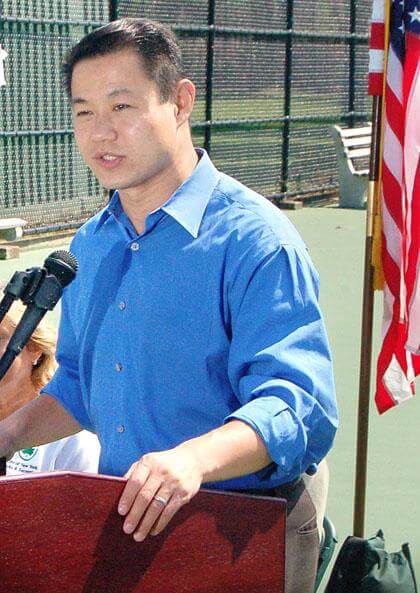By Philip Newman
and Stephen Stirling
At a major campaign rally in Manhattan Tuesday, City Councilman John Liu’s (D-Flushing) mother refuted statements she made in a published report earlier this week that her son had not worked in a Queens sweatshop with her as a child.
Beneath a statue of Confucius in Chatham Square in Chinatown before a crowd of nearly 1,000 waving blue campaign banners for the comptroller candidate, Jamy Liu took the rostrum and said she, Liu and her other children all had worked in a sweatshop in the 1970s.
“I had been embarrassed to talk about it,” Jamy Liu said, reading a statement in English after speaking to the crowd in Mandarin for several minutes.
“We now have nothing to hide,” she concluded.
The controversy has taken center stage in the heated comptroller race between John Liu and fellow Council members Melinda Katz (D-Forest Hills), David Weprin (D-Hollis) and David Yassky (D-Brooklyn). Polls conducted by the Quinnipiac Polling Institute in recent months have shown John Liu has a narrow lead heading into the Sept. 15 primary, but as much as 50 percent of voters remain undecided.
On Sunday, a report in the New York Daily News said that although John Liu claimed in stump speeches and campaign advertisements to have worked in a sweatshop with his mother as a child, both of his parents and the factory manager where his mother worked denied this was true. The article quoted his mother, who said she did not work in the garment factory often, as saying she only brought home “freelance work” she would complete while watching John Liu and his two brothers.
John Liu, 42, quickly responded to the article, calling it an example of “gotcha journalism” that took advantage of his parents.
“A reporter asked for an interview with my parents to talk about my childhood, and we gave her unfettered access,” John Liu said in a press release. “My mom was very reluctant and embarrassed to talk about her experience working in the garment industry.”
John Liu went on to say he helped his mother with her garment industry work both in the factory where she worked and at their home, where he said she often continued to work.
“Not all sweatshops look like a scene from ‘Norma Rae’ or other Hollywood movies, with people toiling in neat rows in a factory setting. These factories do exist, but in addition, some sweatshops use overseas labor involving children as young as 6 years old,” John Liu said. “Others — including the one my mother worked in — combined factory hours with home-based piece work to maximize the exploitation and squeeze the most out of workers. Even after leaving the factory, the work never ends.”
Shortly after putting out the press release, Liu also issued a statement from retired garment industry manager May Chen supporting his story.
“As a longtime union leader in the garment industry, I do not see any contradiction in the stories of John Liu and his family related to his ‘sweatshop’ work. The garment industry, especially in the non-union sector where his mother worked, is itself full of contradictions,” Chen said in a statement. “Child labor and industrial homework are illegal. The workers are mostly women, often mothers with small children, and they are paid by the number of pieces they can produce.”
Reach reporter Stephen Stirling by e-mail at sstirling@cnglocal.com or by phone at 718-229-0300, Ext. 138.



































